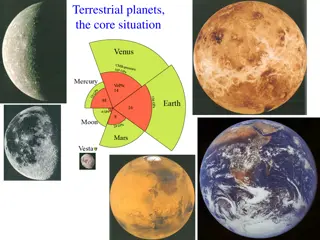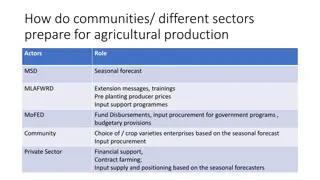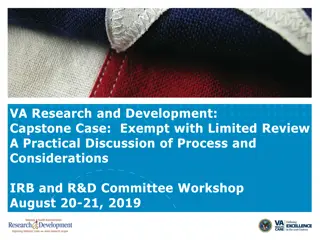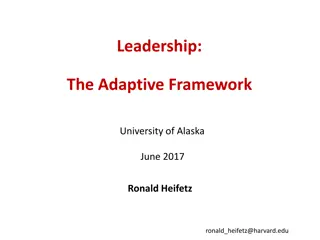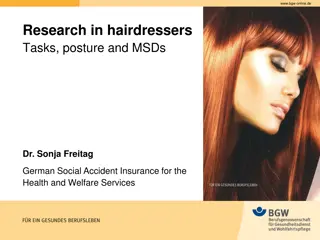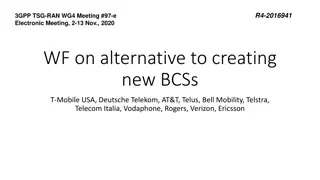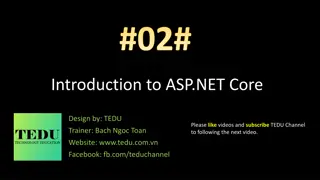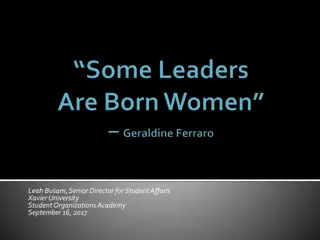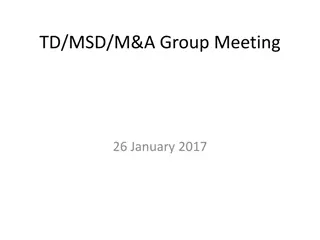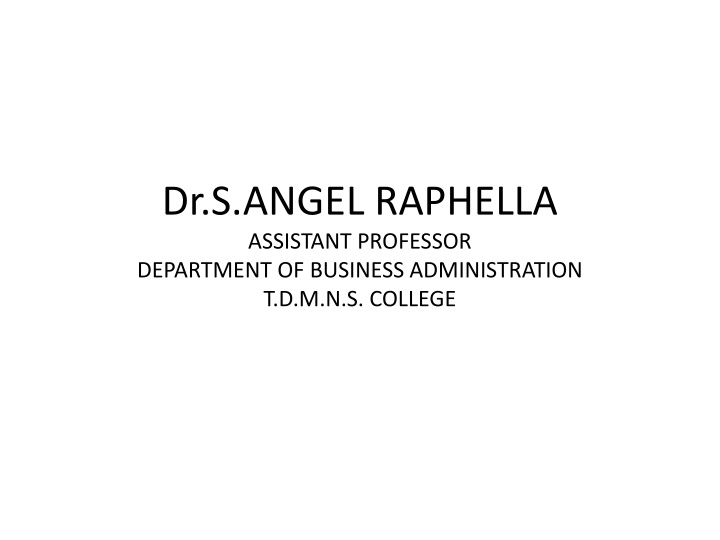
Leadership Criteria for Effective Performance and Success in Business
Explore the essential criteria for effective leadership as outlined by Hall in 2002, including self-management, role modeling, coaching, mentoring, formal support, communication, trust, talent development, responsibility, and leading by example. Learn how Netflix reinvented HR practices with groundbreaking ideas that have influenced companies worldwide. Discover the significance of company values and how they impact organizational culture and success.
Download Presentation

Please find below an Image/Link to download the presentation.
The content on the website is provided AS IS for your information and personal use only. It may not be sold, licensed, or shared on other websites without obtaining consent from the author. If you encounter any issues during the download, it is possible that the publisher has removed the file from their server.
You are allowed to download the files provided on this website for personal or commercial use, subject to the condition that they are used lawfully. All files are the property of their respective owners.
The content on the website is provided AS IS for your information and personal use only. It may not be sold, licensed, or shared on other websites without obtaining consent from the author.
E N D
Presentation Transcript
Dr.S.ANGEL RAPHELLA ASSISTANT PROFESSOR DEPARTMENT OF BUSINESS ADMINISTRATION T.D.M.N.S. COLLEGE
Criteria for Effective Leadership (Hall, 2002 in Weightman,2009) 1. Self management organising oneself to perform 2. Role modelling setting an example of required behaviours 3. Coaching & mentoring supporting others to improve 4. Formal support giving people resources they need to get things done 5. Internal exposure being seen around & championing the team 6. Expressing a vision aims & goals expressed and based in reality
Criteria for Effective Leadership (Hall, 2002 in Weightman,2009) 7. Communicating clearly and regularly 8. Trusting people assuming they will do it right 9. Giving praise formally and informally 10.Spotting talent and stretching it developing the next leaders and excellent performers 11.Taking responsibility when things go right and when they go wrong 12.Walking the talk doing it not just talking it
How Netflix Reinvented HR Harvard Business Review, Jan-Feb 2014 Sheryl Sandberg has called it one of the most important documents ever to come out of Silicon Valley. It s been viewed more than 5 million times on the web. But when Reed Hastings and I (along with some colleagues) wrote a PowerPoint deck explaining how we shaped the culture and motivated performance at Netflix, where Hastings is CEO and I was chief talent officer from 1998 to 2012, we had no idea it would go viral. We realized that some of the talent management ideas we d pioneered, such as the concept that workers should be allowed to take whatever vacation time they feel is appropriate, had been seen as a little crazy (at least until other companies started adopting them). But we were surprised that an unadorned set of 127 slides no music, no animation would become so influential. THE FOLLOWING SLIDES ARE AN EXCERPT FROM THIS PRESENTATION
Many companies have nice sounding value statements displayed in the lobby, such as: Integrity Communication Respect Excellence 5
Enron, whose leaders went to jail, and which went bankrupt from fraud, had these values displayed in their lobby: Integrity Communication Respect Excellence (These values were not, however, what was really valued at Enron) 6
The actual company values, as opposed to the nice-sounding values, are shown by who gets rewarded, promoted, or let go 7
Actual company values are the behaviors and skills that are valued in fellow employees 8
At Netflix, we particularly value the following nine behaviors and skills in our colleagues meaning we hire and promote people who demonstrate these nine 9
You make wise decisions (people, technical, business, and creative) despite ambiguity You identify root causes, and get beyond treating symptoms Judgment You think strategically, and can articulate what you are, and are not, trying to do You smartly separate what must be done well now, and what can be improved later 10
You listen well, instead of reacting fast, so you can better understand You are concise and articulate in speech and writing Communication You treat people with respect independent of their status or disagreement with you You maintain calm poise in stressful situations 11
You accomplish amazing amounts of important work You demonstrate consistently strong performance so colleagues can rely upon you Impact You focus on great results rather than on process You exhibit bias-to-action, and avoid analysis-paralysis 12
You learn rapidly and eagerly You seek to understand our strategy, market, customers, and suppliers Curiosity You are broadly knowledgeable about business, technology and entertainment You contribute effectively outside of your specialty 13
You re-conceptualize issues to discover practical solutions to hard problems You challenge prevailing assumptions when warranted, and suggest better approaches Innovation You create new ideas that prove useful You keep us nimble by minimizing complexity and finding time to simplify 14
You say what you think even if it is controversial You make tough decisions without agonizing Courage You take smart risks You question actions inconsistent with our values 15
You inspire others with your thirst for excellence You care intensely about Netflix s success Passion You celebrate wins You are tenacious 16
You are known for candor and directness You are non-political when you disagree with others Honesty You only say things about fellow employees you will say to their face You are quick to admit mistakes 17
You seek what is best for Netflix, rather than best for yourself or your group You are ego-less when searching for the best ideas Selflessness You make time to help colleagues You share information openly and proactively 18
Project Exercise Working in your project teams (4 students) Map Halls 12 criteria for effective leadership to the Engaging Management Competency Framework What is similar What is different Assimilate the two perspectives (use outcome in project write up)
Influencing & Persuading People (Chapter 11, Managing People, Weightman, 2008) QUESTIONS DISCUSS Think of an organisation you have /work for 1. What are the formal methods of influence? 2. What are the informal methods of influence? 3. Who is the most influential person?
5 Critical Incidents of Influence 1. Delegation 2. Networking 3. Negotiating 4. Meetings 5. Making a case


